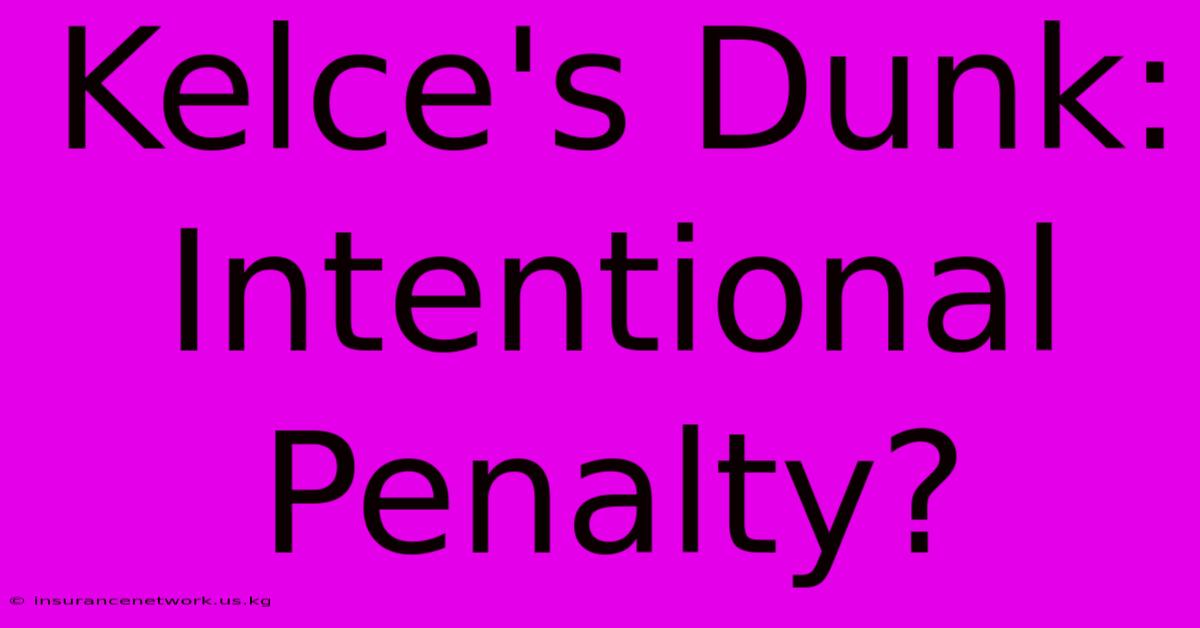Kelce's Dunk: Intentional Penalty?

Discover more detailed and exciting information on our website. Click the link below to start your adventure: Visit Best Website insurancenetwork.us.kg. Don't miss out!
Table of Contents
Kelce's Dunk: Intentional Penalty? The NFL's Newest Controversy
The Philadelphia Eagles' Super Bowl LVII victory was a nail-biter, a back-and-forth affair decided in the final seconds. But even beyond the game's dramatic conclusion, one play continues to spark debate: Travis Kelce's controversial dunk. Was it a spontaneous celebration, or a calculated attempt to draw a penalty? Let's dive into the details and examine the evidence.
The Play in Question: A Closer Look
The play itself wasn't particularly memorable – a routine reception for Kelce. What was memorable, however, was his subsequent celebration. Instead of a typical touchdown celebration, Kelce grabbed the goal post and executed a powerful dunk, clearly violating NFL rules. This resulted in a 15-yard unsportsmanlike conduct penalty. But was it intentional?
Many believe Kelce's celebratory dunk was deliberate. The argument goes that with the game on the line and the Eagles facing a potentially crucial situation, Kelce gambled on the possibility of a penalty. His aggressive celebration, far exceeding the norm, suggests a calculated risk to disrupt the Eagles' momentum and force a crucial timeout. The risk was high, but the potential reward – gaining valuable time and possibly affecting the Eagles' offensive strategy – was even higher.
The Evidence for Intentionality:
- The Aggressiveness of the Dunk: The sheer power and theatrical nature of the dunk were unlike anything typically seen in NFL celebrations. It wasn't a playful tap; it was a forceful, almost defiant act.
- The Timing: The penalty occurred at a critical moment in the game. Disrupting the opponent's rhythm at such a juncture could have had a significant impact.
- Kelce's Reputation: While generally known for his sportsmanship, Kelce has had past instances of borderline-unsportsmanlike conduct, fueling speculation that this was a deliberate act.
The Counterargument: A Heat-of-the-Moment Celebration?
Conversely, others argue that Kelce's actions were a purely emotional response, a spontaneous outburst of joy in the heat of the moment. They point out that the intensity of the game could easily have overwhelmed even a seasoned professional like Kelce, leading to an uncontrolled celebration.
The Evidence Against Intentionality:
- The Unpredictability of Emotions: It's difficult to definitively say whether a spontaneous celebration is truly "intentional" in the same way a premeditated act is. Powerful emotions can override rational decision-making.
- Lack of Direct Evidence: There's no concrete evidence, such as a pre-game strategy discussion, to suggest Kelce planned to draw a penalty.
- The Risk-Reward Analysis: Taking such a significant risk for a potentially small gain seems unlikely from a purely strategic standpoint.
The Lasting Impact and NFL Rules
Regardless of intent, Kelce's actions highlighted the ongoing debate surrounding celebrations in the NFL. The league's rules regarding unsportsmanlike conduct are often criticized for their ambiguity and inconsistent application. This incident again underscores the need for clearer guidelines and potentially a more nuanced approach to player celebrations.
The penalty, whether intentional or not, ultimately had a minimal effect on the game's outcome. However, Kelce's dunk remains a talking point, a microcosm of the emotional intensity and strategic complexities of professional football. It's a play that will continue to be debated long after the confetti has settled.
Keywords: Kelce Dunk, Travis Kelce, Super Bowl LVII, NFL Penalty, Intentional Penalty, Unsportsmanlike Conduct, NFL Celebration Rules, Game Strategy, Emotional Response, Kansas City Chiefs, Philadelphia Eagles, Football Controversy.

Thank you for visiting our website wich cover about Kelce's Dunk: Intentional Penalty?. We hope the information provided has been useful to you. Feel free to contact us if you have any questions or need further assistance. See you next time and dont miss to bookmark.
Featured Posts
-
Tampa Chanukah Menorah Lighting Live
Dec 26, 2024
-
Davis Injury Update Lakers Star Out
Dec 26, 2024
-
Ravens Vs Texans Game Live Score And Updates
Dec 26, 2024
-
Double Holiday Celebration Ideas
Dec 26, 2024
-
Nfl Games On Christmas Day
Dec 26, 2024
